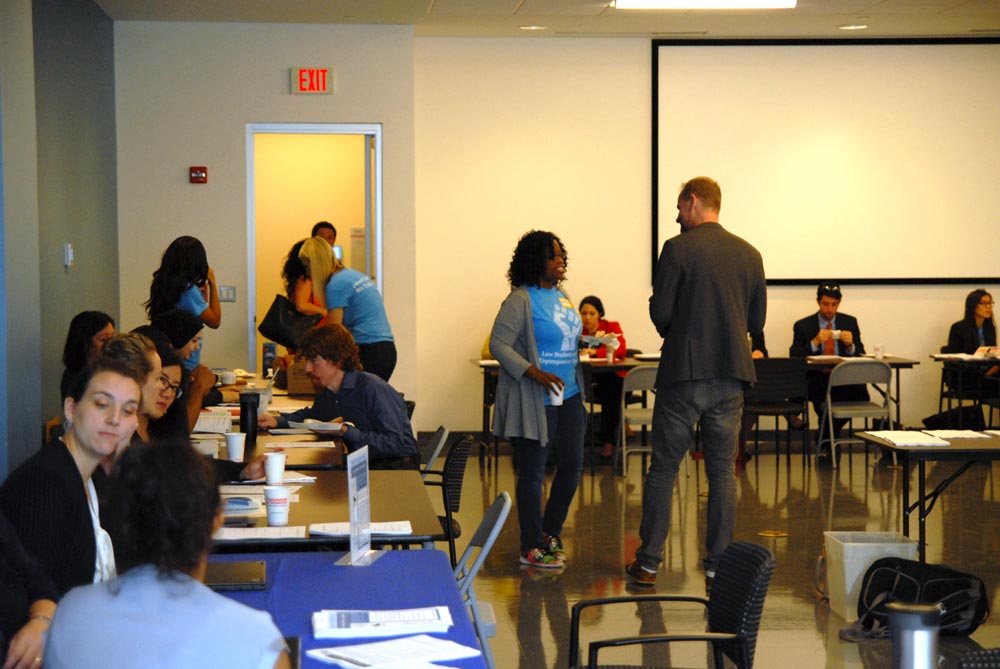There are still hurdles for citizens returning from prison and seeking employment, despite a 2014 law designed to make the job search easier for those with a criminal history. The law, commonly known as “ban the box”, intended to help returning citizens find work and avoid re-offending, prohibits employers from asking about criminal history until after extending a conditional offer of employment. But barriers to employment have not fallen for many, including more than 300 people that registered for an Oct. 23 expungement fair to seal their criminal records, and 100 others that were put on a waitlist.
That fair, held by D.C. Law Students in Court (LSIC) at the Department of Employment Services building near the Minnesota Ave. Metro stop, was also attended by numerous walk-ins. The expungement fair was the largest yet held by LSIC, but its organizers acknowledged that need in the District still exceeds capacity.
Clearing records is about “keeping someone out of a cage,” according to Moses Cook, Executive Director of LSIC. Without stable work or shelter, many people end up re-offending. Even without a conviction, a record showing only charges or arrests is often enough to put off potential employers and landlords.
Kathryn Boothe, Director of LSIC’s Criminal Division, explained that while the vast majority of those coming to the fair could be helped, those with a felony conviction can never have that or anything else on their record sealed.
The demographics of residents in need of expungement service do not reflect those of D.C. as a whole. Black-identifying people composed 89.2 percent of inmates in local jails last year, per LSIC press documents. By contrast, the latest census numbers report that D.C. is only 47.7 percent Black. Arrests, LSIC claims, are similarly skewed.
According to a 2016 Michigan School of Law study by Amanda Agan and Sonja Starr, “ban the box” legislation has unintentionally made the situation even worse for Black applicants. Although intended to help the disproportionately Black population of citizens with records, the legislation has instead, according to the study, led employers to make racial assumptions about criminal records. “It is white applicants with records who appear to benefit far more substantially,” concluded the authors.
The racial disparity in criminal records was immediately clear upon looking around the waiting room of the expungement fair. Mostly white attorneys and volunteers surrounded largely black clients waiting in rows of folding chairs in the center of the room. Various social service providers were also in attendance to offer their assistance.
Fair attendees interviewed as they were leaving reported that they were able to receive at least preliminary help. Since the purpose of the fair was to keep criminal information private, all requested anonymity out of fear that potential or current employers and landlords would discriminate against them.
One woman came to the fair to seal a charge of assaulting a police officer. The charge was trumped up, she said, and the male officer had in fact struck and bruised her. Without the means to afford a private lawyer, however, she had to resort to a public defender who she said “might as well have been the prosecutor.” She was convicted and only narrowly escaped being fired after testifying before the board of her organization and writing numerous statements. Still, she feared that she might lose her job and be unable to find another. “Working with kids, it’s not a good look,” she explained.
Another woman at the fair said she was struggling to advance past the interview stage of the hiring process. Her record “pops up everywhere,” she explained. Still, she had better luck than another woman who complained that she rarely even receives an interview once people look into her background.
One man named Charles said he was escorted off a job site two months ago after his employer submitted him to a background check. Seventeen years ago, he pleaded guilty to a weapons-related charge. Now, he has lost clearance for many job sites. He is still employed doing electrical work, but it has become much more difficult.

A woman named Diane reported no serious obstacles as a result of her record. She has housing and employment, she said, but attributes her situation to the lack of anything remotely recent on her record. However, she theorized that her record may have prolonged the application process.
“You have people who can’t find meaningful work, that can’t find housing, and that’s not good for society either,” argued Boothe, the attorney from LSIC’s criminal division.
Mike Barfield, supervising attorney at LSIC, pointed out that there is a serious inconsistency between the ostensible goal of rehabilitation in prisons and the massive barriers to work placed in the path of returning citizens. “Somebody’s lying somewhere,” he said.
Of course, it is not only those who are convicted and go to prison that struggle to find work. As pointed out previously, a mere arrest on a record can be enough to cause problems. In the search for employment as well as in general, Boothe said, “Innocent until proven guilty is a fallacy. Everyone gets labeled.”








